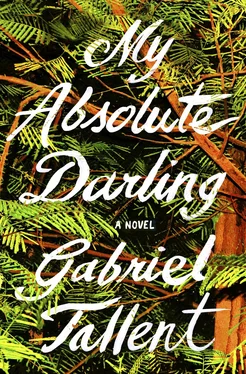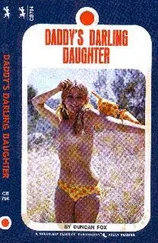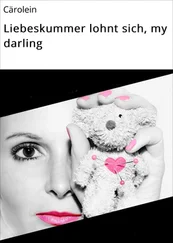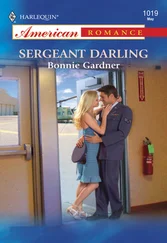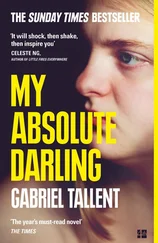He shakes his head and reaches up to the open-faced cherrywood cabinets, takes down the canola oil and pours it across the pan in long curlicues, and then picks up the skillet and tilts it slowly this way and that to spread the oil across it, places it back on the flame.
Cayenne watches silently. She looks sometimes at Turtle, sometimes at Martin. In the dark, her expression is nearly unreadable—if anything, pensive. She has a blocky oval face, a jutting jaw, rounded, clunky cheekbones, Twilight open on her lap. Turtle feels nothing looking at the girl. Nothing. It is like the socket where a tooth should be. She thinks, his mistakes are not your mistakes. You will never be the way he is. You will never.
Martin opens up a cooler he’s set on the floor, takes out two steaks wrapped in butcher paper, slaps them down onto the cast iron, and then stares fixedly at them. He reaches into his pocket and pulls out a handful of change, sorts through it with his thumb, separates out a fifty-cent piece, and flicks it to Cayenne, who plucks it from the air. He replaces the rest of the change in his pocket and walks out of the kitchen, across the living room, and stands against the wall.
“Come here,” he says to Turtle.
Turtle walks to him. He unholsters his Colt 1911 and hands it to her. He says, “You’ve been keeping up?”
“No,” Turtle says.
“You should’ve kept up.”
Turtle looks across the room to the girl holding the coin. She looks at Martin. She’d made a mistake with the skillet, said a little too much.
“I don’t want to do this,” Cayenne says.
“Look at you,” Martin says, smirking. “You don’t even know what we’re doing! Hold that up higher.” Cayenne raises the coin, framed between thumb and forefinger, and she looks from the one to the other of them.
“You can’t be serious,” Turtle says.
She looks at him.
“I don’t want to do this,” Cayenne says again.
“You’re gonna be fine, sweetheart,” Martin says. “This is gonna be fun.”
“I haven’t been keeping up,” Turtle says.
“It’s all right,” he says, “Daddy’s here,” and he laughs at her expression.
“You can’t be serious,” Turtle says again. She looks to the girl sitting cross-legged on the kitchen counter. A single wisp of black hair lies across Cayenne’s face and the girl does nothing to remove it. Behind her, the only light in the kitchen comes from the blue flame in spreading horizon across the underside of the skillet.
Turtle says, “You’re not serious.” She drops the magazine and locks the slide back. In the gloom, the exposed barrel glitters with brass fouling, and that’s a bad sign. She has known him to carry cheap range ammo and reloads, so she thumbs out the first round in the magazine stack. It is Federal HST .45 auto +P 230 grain. It’s much too powerful.
She looks to him, to see if he’s still serious, and he is. She seats the magazine, drops the slide, steps into her stance. Martin comes around behind her and puts his hands on her arms. He adjusts her hips and then her shoulders. Into her ear, he says, “Loosen up a little bit. Relax. There. Steady.”
Turtle lines up the sight post and notch, then runs her focus out from the sight picture to the coin, framed between Cayenne’s small thumb and forefinger; it looks unimaginably tiny, a bare spark of silver in the dark, the girl looking right back at her and then closing her eyes, her chest rising with steadying inhalations, the coin moving slightly up and down with every breath. Cayenne has set her book down on the counter and her fingers stray toward it, find the book’s hardbound edge, and stay there, touching it as if for protection.
Behind the coin, Turtle can see the kitchen door, with its blue paint peeling away in ribbons, and in the vacant circle where the knob should go, a single blue-bellied lizard with its head cocked up, blue throat just visible and tagged with deer ticks like blue sesame seeds, the keeled scales of the neck standing up like thorns, the spiny crests of the brow silhouetted perfectly in that keyhole of evening light.
Turtle breathes and draws her attention back into the sight picture, blurring the girl out of focus, bringing the sight post into perfect relief, and focusing on the top edge of that post, placing that edge on the unfocused silver spark of the coin. Nowhere is she more aware of the shallow depth of field of the human gaze. She cannot keep both the girl and her sight post in focus. Martin says into her ear, “Don’t think, just put your brain in your lunch box and go to work. Don’t think. Just aim. Just shoot.”
Turtle pans the gun aside, finds a chip of paint on the door, six inches up and six inches left of the coin, and she fires. The Federal HST 230 grain is explosively loud and kicks hard, throwing a divot of wood off the door. Cayenne flinches but does not drop the coin, and Turtle brings the barrel into perfect control, breathes and finds that bullet mark and fires again, throwing up a second divot an inch to the left of the first, Cayenne flinching again and gasping, the coin jumping involuntarily in her hand, her brows screwed together, little lines laying up between them, the coin quivering. Turtle brings the gun to bear on her third shot, pulls the trigger, and nothing happens.
She looks at the top of the gun and sees a shell stovepiped in the ejection port. Usually, when the slide doesn’t close, she feels the difference in the recoil and hears the different, flatter note of the gunshot. She isn’t paying attention. She isn’t focused.
“The gun is dirty,” she says to Martin.
“You’re limp-wristing,” he says, meaning that her grip isn’t firm enough for the action to work properly.
“No,” she says. “It may be fouling, it may be the magazine, it might even be a defective extractor.”
“Or it’s your limp wrist.”
She lowers the gun and lets Martin observe her bullet marks in the door, noting their spread, about an inch. He takes her point. “Well,” he says, “that would’ve been fucked up, wouldn’t it?”
“Yeah,” Turtle says.
“She missed,” Cayenne says. Turtle can tell the girl is trying to keep her voice calm, but it is tight and nervous nonetheless. When neither reacts, she says again, “She missed.”
Turtle walks to the counter, beside the girl. She ejects the magazine and drops the jammed casing, lets the rack spring forward. Then she reloads the gun and slivers back the slide to show the bright brass casing seated correctly in the chamber. She sets the gun down. This close to Cayenne, she can hear the raggedness in the girl’s breathing. She has put on a pair of pink socks since Turtle saw her in the driveway. Perhaps the wood floor is too cold for her. The socks are large on Cayenne, the baggy heels at the girl’s ankles, the toe boxes pushed out irregularly. Turtle turns back to Martin. “I’ll clean that gun for you later. It’s dirty.”
“Nah,” he says, walking back to the kitchen, “it’s not dirty.”
“I’ve seen dogs,” she says, “with assholes cleaner than that gun.”
Martin walks laughing back to the skillet, tests the pliancy of the steaks with the pad of his finger, and compares it to the meat of his own palm, touching thumb and forefinger together to match the pliancy of rare steak. He draws his belt knife and flips them with the broadside of the blade, shaking his head. The steak comes gorgeously off the black curing. “You bitch,” he says, squinting down into the skillet, his mouth half open, half grinning, wiping the knife blade across the thigh of his Levi’s and sheathing it.
Cayenne takes conspicuous, steadying breaths. Turtle can smell the girl; her unwashed body, her childish sweat, the smoke of Martin’s Swisher Sweets in her clothes.
Читать дальше
Конец ознакомительного отрывка
Купить книгу
